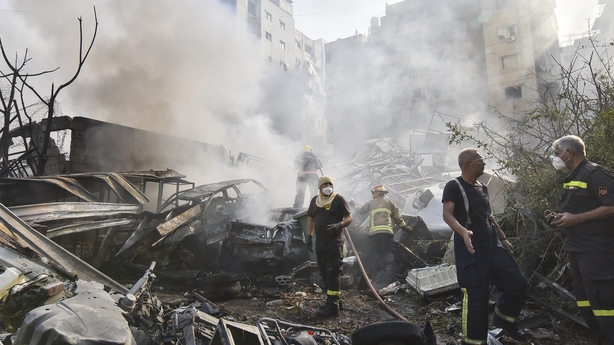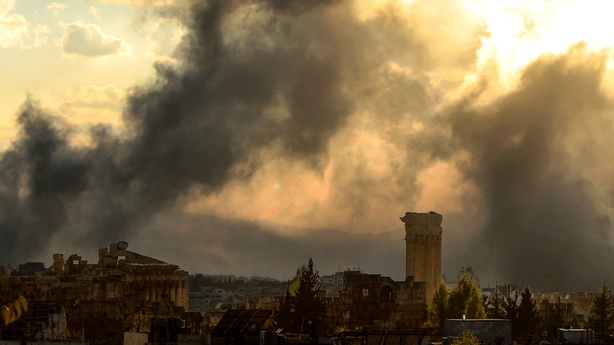Lebanon's health ministry has said 52 people have been killed in Israeli strikes in the country's east, attacks for which the Israeli army had not issued evacuation warnings.
The ministry reported "52 people killed and 72 wounded in an updated toll of today's Israeli enemy strikes on the Baalbek-Hermel region".
Twelve of the victims were killed in the village of Amhaz, it said, while nine others were killed in Yunin and eight in Bednayel.
Meanwhile, an Israeli strike in Syria near northeast Lebanon forced a border crossing to shut, Lebanon Transport Minister Ali Hamieh said.
Israeli bombing closed the crossing last month and it had partly reopened before the latest strike.
It comes as Lebanon's prime minister accused Israel of rejecting a ceasefire after the Israeli military bombed south Beirut for the first time this week.
In Gaza, where Israel has been engaged in a major offensive in the north for nearly a month, a Hamas official said the Palestinian militant group had rejected a proposal for a short-term truce.

United Nations chiefs called the situation in northern Gaza "apocalyptic" and warned the entire population there was at risk of death.
Since late September Israel has been fighting a two-front war, against Hezbollah in Lebanon and against Hamas in Gaza.
At least ten strikes hit Beirut's southern suburbs before dawn after Israel issued evacuation warnings.
"The raids left massive destruction in the targeted areas, as dozens of buildings were levelled," Lebanon's official National News Agency reported.
The news agency also reported strikes on Bint Jbeil, Tyre and Nabatieh in the south.
The Israeli military said it was continuing operations against both Hezbollah and Hamas.
The Lebanon strikes came a day after Israeli Prime Minister Benjamin Netanyahu met US officials to discuss a possible deal to end the war against Hezbollah, ahead of Tuesday's US presidential election.
We need your consent to load this rte-player contentWe use rte-player to manage extra content that can set cookies on your device and collect data about your activity. Please review their details and accept them to load the content.Manage Preferences
Lebanese Prime Minister Najib Mikati condemned the Israeli attacks.
He said the renewed bombing of Beirut's southern suburbs and strikes on other areas "confirm the Israeli enemy's rejection of all efforts being made to secure a ceasefire."
Israeli warplanes again hit the eastern city of Baalbek, after strikes there yesterday.
Smoke rose from the remains of a house in the city's Douris neighbourhood.
"The place that was bombed is a residential area. Our neighbour is a woman with a disability. She was injured while at home," said Jaafar Durra, pointing to a pancaked building.
Baalbek boasts Roman temples that UNESCO has designated as World Heritage site and the UN special coordinator for Lebanon, Jeanine Hennis-Plasschaert, warned the war has put the country's cultural heritage site in "deep peril".

UN positions in Lebanon risk being 'occupied' - peacekeeping chief
The UN peacekeeping chief has said that the blue helmet force in Lebanon will hold its line despite facing attacks in recent weeks, adding that its positions would be "occupied" if it left.
More than 10,000 peacekeepers with the UNIFIL mission have been stationed in southern Lebanon since 1978 and are tasked with monitoring the "Blue Line" of demarcation with Israel.
Jean-Pierre Lacroix, under secretary-general for peace operations, said that "UNIFIL peacekeepers are staying, they're holding their line, and they're determined to continue doing what they're mandated to do."
He said the force had rejected an Israeli request that it move five kilometers from the Blue Line.
"First of all, because there is a mandate... we are duty born to the mandate, the peacekeepers need to stay," Mr Lacroix said in an interview with the UN Information Service.
"Second, because we thought that if those positions along the Blue Line are abandoned, then they would likely be occupied by one party or the other. That would be very bad for many reasons, including the perception of impartiality and neutrality of the United Nations," he added.
On Wednesday, a UNIFIL spokesman said the force had recorded more than 30 incidents in October resulting in property damage or injury to peacekeepers, about 20 of them from Israeli fire or action.
Camp Shamrock, where hundreds of Irish peacekeepers in Lebanon are based, was struck by a rocket on Wednesday night.
Irish peacekeepers believe the rocket was travelling from north to south into Israel.
The rocket fell in an unoccupied area of the camp and caused minimal damage on the ground with all Irish personnel reported safe and well.

